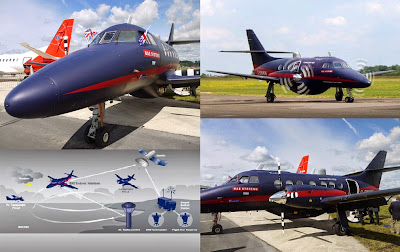“The
flights were part of a series of tests helping flight regulators and Nats to
understand how these flights work, and what they need to do were they to go
ahead and put a regulatory framework in place for the unmanned flights in
manned airspace”
Representative of BAE
Systems, one of the companies to have invested in Astraea (Autonomous Systems
Technology Related Airborne Evaluation & Assessment)
Europeans,
it seems, have something over their American Silicon Valley counterparts when
it comes to developing practical Technology that POC (Proof of Concept).
Despite Google developing cars that can drive themselves, it’s the European Car
maker Volvo involved in a Group project called SARTRE (Safe Road Trains for the
Environment) that’s developing practical Autonomous Motor Vehicles as stated in
my blog
article entitled “Volvo
Testing Autonomous Motor Vehicles in Spain in Live Traffic - EU Project SARTRE
adds self-driving AI with smartphone Control”.
Now
the Europeans are at it again. ASTRAEA (Autonomous Systems Technology Related
Airborne Evaluation & Assessment), also the name of Zeus daughter in Greek
Mythology is a consortium of companies that has pioneered the first inaugural
flight of an unmanned 19-seat JetStream Commercial Passenger Plane in Shared
Commercial Airspace in April 2013 as reported in the article “Pilotless flight
trialled in UK shared airspace”, published 13 May
2013 Last updated at 12:15 GMT, BBC
News.
According
to the article “The
future of air travel doesn’t need pilots”, published May 14,
2013 By Graeme McMillan, DigitalTrends,
the ASTRAEA consortium is composed of the following companies:
1. BAE
Systems
2. AOS
3. Cassidian
4. Rolls-Royce
Like
SARTRE for Cars, the ASTRAEA Consortium has the support from CAA (Civil
Aviation Authority) and the UK Government, who’ve contributed some 26 Million
Pounds to the project thus far.
The
Plane took off from Warton, near Preston in Lancashire and landed in Inverness,
Scotland, a flight of some 800 kilometer (approximately 500 miles) completely
under the control of a Pilot on the ground.
This first Aircraft, basically a Guinea Pig to test out the idea, was
flown remotely by a pilot trained by the NATS (National Air Traffic Services). In
this inaugural flight, no passengers were on board, and a test pilot was on
board to make sure the airplane performed as expected.
Otherwise,
it was completely controlled from the ground, a lot like a UAV (Unmanned Aerial
Vehicle) or Drone as described in my blog
article entitled “GOJ
can develope UAV's as a means of giving the Police eyes in the sky -
Inspiration for Aviators in Jamaica via G.I. Joe Retaliation”.
The
advantages of Autonomous Aircraft are the same as Autonomous Airplanes:
1. Reduce
Human Pilot error by removing the pilot
2. Faster
flights
3. Cheaper
airline flights and Air Freight
Thus
the future of Travel it seems is via the air, the last uncluttered airspace.
Plans are also afoot for the development of Flying Cars, specifically the
Terrafugia TF-X as described in my blog
article entitled “Terrafugia’s
Flying Hybrid 2013 Terrafugia TF-X to debut in the Fourth Quarter of 2013 -
Shara Tibkin's Sweet Dreams of The Jetsons wants Christina Aguilera's Your Body”.
The Terrafugia TF-X is basically flown by the Car using a preset flight path;
the Driver is not involved in flying the Car.
The
next step in the development of Autonomous Airplanes is to eliminate the need
for even someone on the ground to pilot the Aircraft and instead use an onboard
Artificial Intelligence program to make the Aircraft fly itself. The Ground
Pilot would only be needed to pilot the Aircraft in case the plane got out of
control. If ASTRAEA gets this technology right, they’ll be The Kings of Summer
(2013).



No comments:
Post a Comment